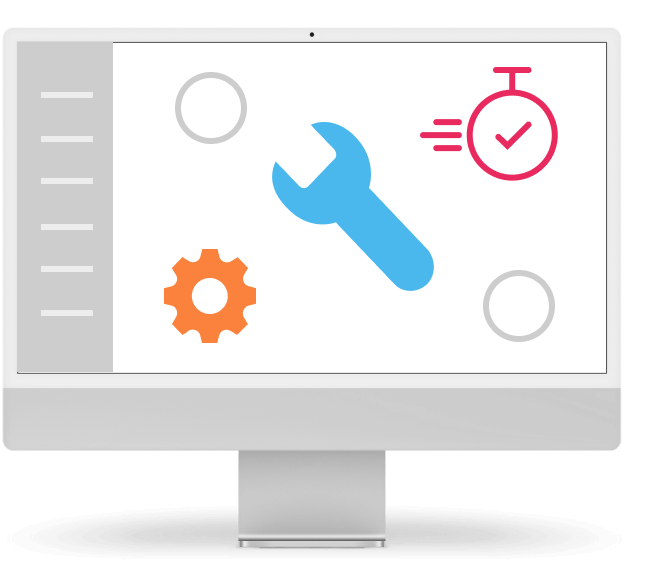Cloud Computing - What Are the Options? (Clear Guide)
Content
It’s as if the last decade has been the time for cloud services to run us over like a tsunami.
But the initial enthusiasm has become a total confusion in many companies recently – where do all the things run and how much does it really cost.
Besides there is a new wave of subsidies offering companies the chance to digitalize. But… how do you make the right choice when the selection is so vast? In this article, we will try to explain the differences among the cloud services. We will not focus on the level of user interaction with the infrastructure management (such as IaaS, PaaS or SaaS – those are the topics of our videos).
This article will break down individual types of public and private clouds and will also uncover the difference between a hybrid cloud and a multicloud.
Public Cloud
We all have probably encountered the names of Azure, AWS or GCS, These services all fall down i the category of the public cloud which means that the computing resources you receive as a user – virtual processors, RAMs and storage – are shared among all the users.
In reality this means that first comes, first serves – in this case, first counts. Because the physical computing resources of the provider are shared, in an extreme case, it could happen that instead of saving an item into your accounting software, you will be queued until all the others who came before they make their computations.
You will probably never encounter such an extreme situations but it clearly shows the main principle of public cloud operations. That includes virtual private servers (VPS) and virtual data centers (VDC).
Virtual private server (VPS)
Virtual private server, a VPS, is a pre-configured server that runs online. Technicians have always awaited new physical servers which have provided a certain output – number or processors, RAMs and storage. The same applies to a VPS. You purchase a server that has a certain computing power. It just pon’t be delivered by post by the online dashboard of the provider.
Contrary to the physical servers, virtual ones cannot have the computing resources changed. The VPS configuration cannot be adjusted and any edits or changes have to be done by purchasing another virtual server, no matter how small teh changes have to be.
And do not be mislead by the word private in the name – we are still in the sphere of the public cloud. The virtual server is private because yo are the only ones using it.
There is also one more aspect that comes to mind when we talk about VPS. Providers of these services often offer the option managed – meaning the servers are managed by the provider so that you don’t have to take care of it. It is necessary to realize, though, that at that point your provider has access not only to the configuration of your server but also to your data – the same way your technicians take care of the physical servers in your server room. It is appropriate to consider if the benefits truly outweigh the higher security risk.
advantages
- Low price
- No need for advanced knowledge to set it up
disadvantages
- Complicated selection
- Minimal ability to manage the environment
- Given configuration of resources
- Higher security risk with managed services
virtual data center
The second public cloud service is the virtual data center. Let’s get back to the basics – the definition of a physical data center. It is a environment where you can efficiently run servers and any related devices. The VDC environment is free from the hardware burden and everything is moved to the cloud.
You have available an environment – processors, RAMs and storage – but how many servers you build from that is up to you. Besides you can create your own network systems which manage the communication among servers and their possible connection to the Internet.
advantages
- Environment precisely tailored to your needs
disadvantages
- Need to purchase several components
- Price compared to VPS
- Need of technical knowledge to manage the environment
Private Cloud
Now we get to the part that is defined by the word dedicated. Private cloud provides you with dedicated resources no one else can touch. This carries along higher costs because you don’t use public resources but you also use physical machines most of the time – if you have an on-premise solution.
On-premise private cloud
This solution is exactly what it says – physical infrastructure placed on your premises with a cloud running on it. The advantage compared to regular physical servers is the more efficient way of utilizing hardware computing resources. This is thanks to the virtualization. Also the use of automation and orchestration help the cloud environment be more efficient.
Virtualization – if we have a physical server that has 2 10-core processors than physically I can only uuse the processors as a whole. Virtualization enables us to use individual threats of the processors so thanks to the virtualized environment, the number of virtual processors is 20. It shows that virtualization is more efficient than the use of regular physical servers.
On-premise private cloud brings everything to your hands – you have the security under control, access, care and operations. But that does bring along larger costs.
advantages
- All aspects fully under your control
disadvantages
- High price
- Necessary investment into hardware and care for it
- Limited scalability – guided by the HW parameters
On-premise private cloud as a service
If you don’t want to undergo the initial high investment into hardware then it is possible to build the private cloud on your premises but have it provided as a service. In reality that means that outside of cars running on leasing, you also have your IT infrastructure provided that way. Instead of an investment, yu have a fixed monthly payment for rental.
This can pay off in case you need a private cloud on servers placed on your premises but you cannot afford to buy servers. Then you don’t have to focus on either the build or the installation because all of that is then the responsibility of the service provideer.
advantages
- More effiecient cost spread when needing this kind of solution
disadvantages
- High price
- Whole solution as a property of the provider
- Need to enter at least a mid-term contřract
- Costly adjustments
private cloud on shared infrastructure
The name of this cloud service may sound confusing regarding the fact we are talking about private cloud but the shared infrastructure interferes. Let’s look at the individual aspects of the service.
Virtuální cloud Virtual Cloud – IT doesn’t require own physical infrastructure so 100% of the CAPEX is the responsibility of the provider
On Shared Infrastructure – use of the computing resources exactly when you need them which optimizes operational costs
Private – all of the cloud contents including the data are accessible only by the customer
Maybe you are looking for a solution the provider does not invade but you also don’t want to expend large summs to purchase and take care of the hardware. This type of cloud services includes all benefits of the private solution and it also adds the benefits of the shared solution – the shared physical infrastructure.
This cloud service is almost identical to the virtual data center with the difference of the private solution. It is a full substitute to the owned physical environment in a server room as Atos have learned for themselves.
advantages
- Lower price
- Whole environment full yunder control
- Adaptability
disadvantages
- Need of technical knowledge
Hybrid Cloud
Now we are getting to a younger technology territory. Currently there have spurred two phenomena – hybrid cloud and multicloud. Sometimes they are interchanged which can sometimes turn your back on you when selecting the right solution.
Hybrid cloud is the connection of dedicated and shared computing resources, usually a specific physical HW and shared resources from a public or private cloud. As we have mentioned, scaling physical infrastructure is not very easy, especially when you hardware is already at the top of its game. At that point, you have two options – purchase additional physical servers or use the external cloud solution to increase computing capacity.
Hybrid cloud helps you utilize resources from the provider of cloud services to scale up while the applications that are necessary to be run on dedicated machines, they can still run on the dedicated physical infrastructure.
advantages
- Adaptability
- Solution of individual and special needs
disadvantages
- Higher price
- Complicated environment for management
Multicloud
Multicloud is a solution that enables you to work efficiently with multiple cloud platforms. We can, for example, have a development company that uses AWS and GCP, At that point, we are looking for a tool that will enable us to manage all resources at once.
For example, CLOUDPOINT K8s is provided as a tool to automate the deployment of whole Kubernetes clusters and virtual machines on various cloud provider platforms using their resources. You can utilize our cloud along the others.
advantage
- Easier use of current cloud providers
disadvantage
- Need of complex knowledge of various services and price policies
- Scattered environmment due to insuffieicent architecture planning
Summary
The list of cloud services is truly vast today and it is almost a superhuman task to get oriented in the services, formats, business and pricing models of all the providers. Especially when you want to apply for a subsidy, it is a priceless choice to ask for a consultation so that your company doesn’t digitalize in a way that would bring more harm than benefit.
Public and private cloud, hybrid cloud and multicloud all have their place but you just have to figure out which one should have a place at your company. And we would be happy to help you.
Dictionary
Virtualization – if we have a physical server which has 2 10-core processors then physically we can only use the processors as a whole. Virtualization enables you to use individual processor threats so the virtualized environmment has at its hands 20 processors which can be for example divided among 4 virtual servers. Thanks to this, virtualization is much more efficient than regular physical servers.
Cloud – service that allows users to tap into the same package of shared computing resources
On-premise/in-house – use of technology located on the premises of the customer
Dedikovaný – set aside for the use of a specific customer





